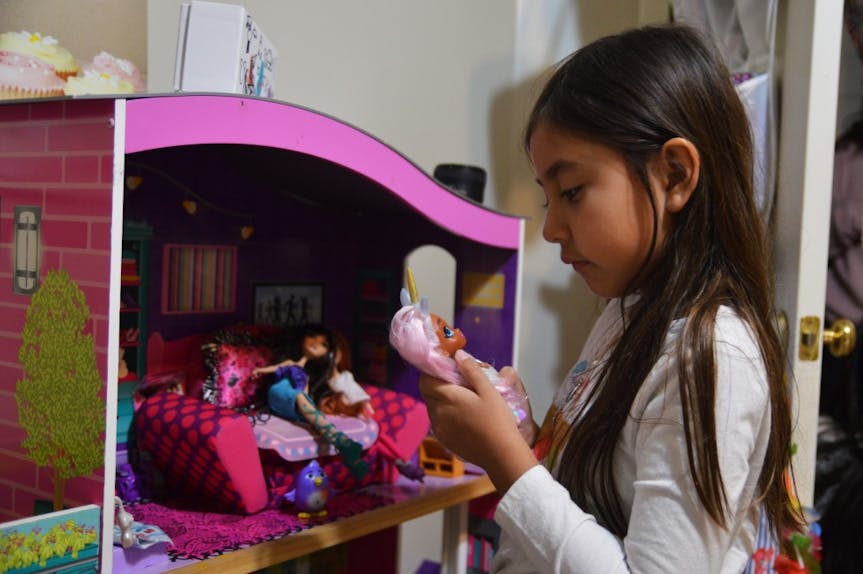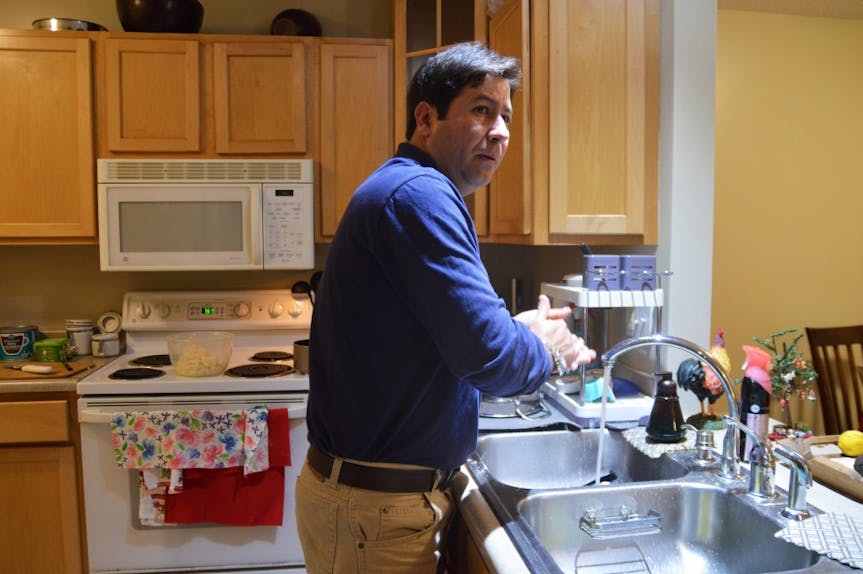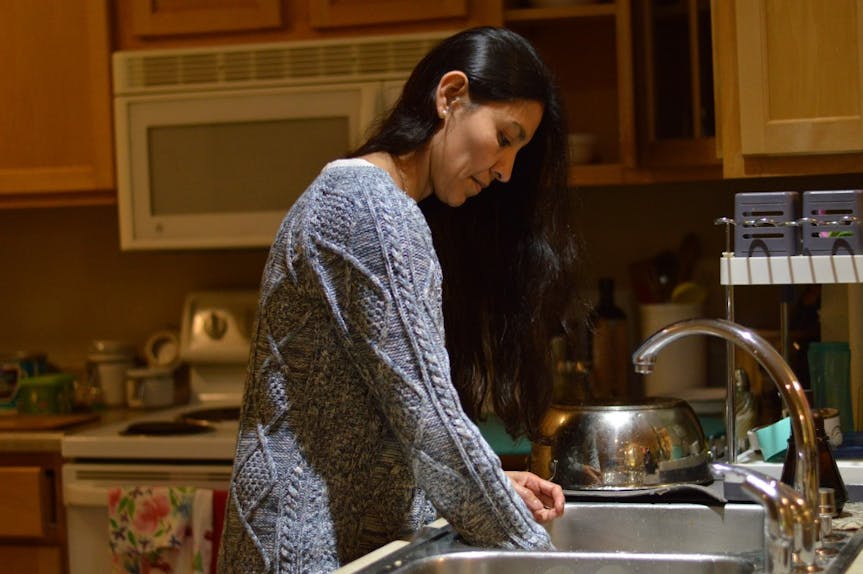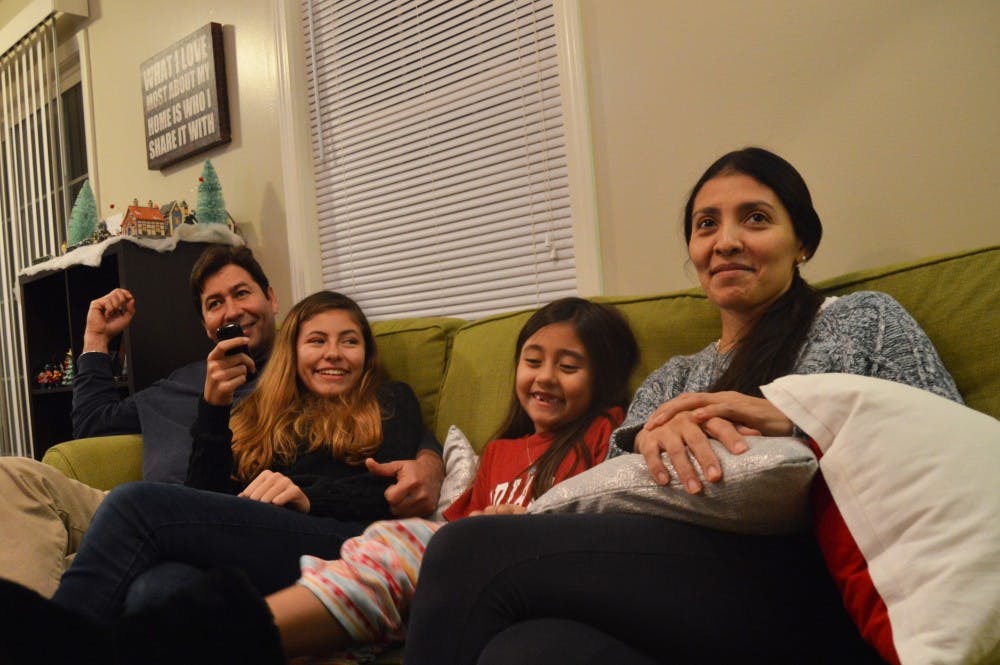Emi leans toward Paola the entire service, copying each of her small movements. She and her sister, Sara Sofia, 11, pick the lint off of their mom’s leggings, mimicking the way she flicks it onto the ground.
As the priest gives the weekly reading, Paola follows in her personal Spanish prayer book, her finger pointing to each word so that Emi can follow along.
Each family member offers God a personal prayer. Paola prays for her family, for her mom who is sick in Venezuela. For the country she loves deeply, still, even after she had to flee its violence.
Paola, 40, her husband Gustavo, 43, and their daughters have lived in the United States as asylum seekers for two years and four months.
She prays that no matter what happens with their asylum case, the result is the best scenario for her family. She prays to accept God’s will.
“I pray for health,” Gustavo said. “I pray for people suffering.”
“I pray for people who are lost, who are lost from the path of God,” Sara Sofia said. “I pray for peace of the world.”
***
Many families like the Carmonas are waiting to be granted asylum. But the Carmonas, Paola said, are lucky. They have medical insurance in case of emergency, and they have been legally permitted to work. She said she thinks the U.S. government has been more relaxed with Venezuelan asylum seekers than with refugees from other countries.
But the Carmona family is still waiting for their interview with an immigration officer, which they believe will take place in 2019. Only then will they be considered for asylum.
Amidst a grave humanitarian and financial crisis, Venezuelans are fleeing en masse. Millions of people now seek new countries to call home.
From April 2017 to March 2018, the U.S. received 28,919 asylum applications from Venezuelans, according to U.S. Citizenship and Immigration Services. No other group of people requested even half that many applications for asylum in the U.S.
Many Venezuelan asylum seekers believe they will be granted asylum because of the U.S. government’s open disdain for the Venezuelan government and its leaders. President Trump has publicly condemned Venezuelan President Nicolás Maduro on multiple occasions.
Historically, the U.S. looked favorably upon refugees from countries that provoked its political animus. For example, when tensions remained between the U.S. and Cuba after the Cold War, Cubans had an easier time entering and staying in the U.S. compared to immigrants from other countries, according to the Migration Policy Institute.
But the Venezuelan asylum seekers who believe the U.S. will grant them asylum because of political strife between the countries’ governments are likely wrong. Immigration officials have recently become stricter with Venezuelans arriving in the U.S, according to the Pew Research Center.
Like the Carmona family, many of the Venezuelans who come to the U.S. arrive with legal tourist visas and request asylum after their arrival. But this mode of seeking asylum is increasingly difficult — 240,000 Venezuelans received tourist visas in 2015, according to the Pew Research Center. By 2017, that number decreased to 57,000.
U.S. officials can detain Venezuelans with tourist visas if they believe they plan to remain in the U.S. long-term. Paola said she knows people whose legal visas were revoked upon arrival.
As immigration policies harden, and fewer asylum cases are granted, the Carmona family waits in limbo to be considered for asylum. They are prepared for whatever future God, and the U.S. government, will choose.
In the meantime, they build a life for themselves in Bloomington. And they pray.
***

The Carmona family used to feel safe in their neighborhood in San Cristóbal, Venezuela. They lived in a beautiful home near the top of a hill.
Emi and Sara Sofia played in the park just behind their house, and Paola never worried, because everyone knew each other in the neighborhood. There was a basketball court and a playground. The trees, dripping with mangoes and clementines, were so lush they sometimes blocked the sun.
Gustavo was an industrial engineer with his own firm in Venezuela. He was friends with the mayor of their city, who was a vocal opponent of leftist President Maduro and his agenda.
Gustavo organized protests against the government, building a reputation in the neighborhood for resistance against corruption.
Paola, who worked within the government as a labor rights attorney, kept her opinions to herself.
“I shut up,” Paola said. “I never said a thing.”
Her silence did not stop militant pro-government gangs from targeting her and her daughters.
The gangs, colectivos, play a crucial role in reiterating and enforcing the government’s policies. They are civilians armed by the government to control and intimidate the Venezuelan people.
In an attempt to repress speech, they threaten the families of people who speak publicly against the government.
In 2014, gang members circled the Carmona family’s home. They rode around and around on motorcycles, shouting and throwing rocks. They said if Gustavo protested the government again, they would set fire to the family’s cars.
Paola hid her daughters under a table until the men left.
They escaped that day, but gang members on motorcycles still followed them when they walked around town.
The following year, as Paola waited in the car for Sara Sofia and Emi to complete their after-school lessons, a man on a motorcycle rapped his knuckles on her window.
She watched the gang member lift the hem of his shirt to show the gun on his belt. Without a single word, he released his shirt and rode away.
In 2016, gang members broke into the family’s home in the middle of the night. Two men scaled the wall behind the family’s house, a wall Gustavo had just built for protection.
It was raining. They strode past Paola’s herb garden, past the aloe vera plant that Sara Sofia swears was ten times larger than the one in their living room in Bloomington.
A masked man broke a window, and it shattered everywhere.
“He had a blue shirt,” Paola said. “I will never get the blue shirt out of my mind.”
The family’s dogs — Sinu and Lola — barked loudly, blocking the gang members from entering the room Paola was in. The dogs never let them pass, and they eventually gave up and left.
No one was hurt, but the family was shaken.
“It’s very complicated when a rich country becomes poor,” Paola said.
In Venezuela, it is nearly impossible to go to a doctor, or even just to buy medicine. There are shortages of everyday necessities and food staples like sugar and flour. Prices double roughly every 26 days, according to the BBC.
The country is rich in petroleum, its main export to foreign countries, but oil prices fell sharply in 2014 and Venezuela was short on cash. The government is quick to print more bills, fueling dizzying hyperinflation.
Crime rates are staggering, and nearly 87 percent of the population lives in poverty, according to Reuters.
Many Venezuelans blame the leftist government. They claim its leaders are politically corrupt and economically irresponsible.
After the incident in their home in 2016, the Carmona family booked tickets to Indiana, where they already had family.
They fled Venezuela quickly, on a tourist visa, without telling anyone their plan to request asylum.
People would not have suspected anything out of the ordinary, since the family used to vacation in the U.S. regularly.
Their home remains just as they left it — cars parked, beds made. Sinu and Lola wait inside for their owners. For now, they have Gustavo’s cousin to check in on them.
A passerby might wonder when the people who live inside will return from vacation.
***

Gustavo has had a few different jobs in Bloomington. He wanted to work in engineering, but resorted to other jobs to make ends meet. At different points, he painted houses, worked for restaurants and did construction at a golf course close to his house. The physical labor is hard on him because he isn’t used to it.
Paola cleans houses and finds new work by word-of-mouth. Most of her clients are immigrants.
They live in a 3-bedroom house decorated with seasonal knick-knacks and inspirational signs. One reads: “What I love most about my home is who I share it with.”
The girls speak perfect English by now, shimmying easily between Spanish and their second language. Gustavo and Paola have taken evening language classes but look to their daughters for quick pronunciation and translation support.
It took time to learn and adjust. When they first moved, Sara Sofia only knew a few English words from listening to American artists like Katy Perry on the radio in Venezuela.
When Emi first started school, her classmates trapped her on the playground. They stuck her hands and feet in a net intended for climbing, and she came home with rope marks on her arms.
Everyone apologized, including the principal, one of the classmates and her parents. Emi even eventually became friends with one of them.
She said it is difficult for kids when they have to move. She didn’t get to bring any of her toys, even though she wanted to.
She and Sara Sofia also bemoan the lack of Venezuelan sweets in Bloomington. In their old kitchen, they would steal scoops of a special Venezuelan powdered milk when their mom wasn’t looking.
“We all had hard stuff,” Emi said.
Some things are harder than others. Emi is still afraid of men who ride motorcycles. The girls try to shield themselves when they hear the roar of an approaching bike.
But things are better now, even if the girls’ friends don’t exactly understand what they are going through. Sara Sofia loves living in Bloomington.
“I am incredibly proud of where I was born,” Sara Sofia said. “But I want to make my life here.”
She understands she might not be allowed to stay.
To request asylum in the United States, asylum seekers have to be physically present in the country upon applying. They also have to be refugees who fled their countries and cannot return because of a well-founded fear of persecution.
That fear of persecution is based on race, religion, ethnicity, political opinion or membership in a social group.
There is currently debate among immigration experts on how to use those criteria to grant asylum. Paola said the U.S. is getting persistently stricter about who can and cannot stay.
Venezuelans are different from many other people who immigrate to the U.S., Paola said. Those who are here could afford to make the journey in a legal way. Many of them are educated and highly skilled.
Unlike many people who make their way to the U.S., Venezuelans are not here to pursue the American Dream, Paola said. The Carmona family is not here to get rich, or even to send money back home.
“We just need a respite from the chaos that lives in our country,” Paola and Gustavo said in an email.
They also want to maintain a good quality of life for their children.
But it is difficult. They are not here to enjoy a vacation, like they did in years past. They have to learn a new language, adapt to a new lifestyle and find new work.
“Our immigration has been forced in all aspects,” they said.
***

Gustavo now has a job at Viva Mas, a new Mexican restaurant in Bloomington. The building’s interior is a work of art, each wall hand-painted with vivid colors by a Mexican artist.
It’s the day before the official opening, and everyone in the restaurant is friends or family. Gustavo wears a black uniform and a red-and-black striped tie. Paola, Sara Sofia and Emi sit in a booth, stealing bites of chimichangas and tres leches from each other’s plates.
Paola said people have been so welcoming to them here. Last year, when she didn’t have a car, clients would offer to drive her to her next appointment so she wouldn’t have to walk in the snow. So many Bloomington locals offer personal, medical and financial support.
The Carmona family is more likely to be granted asylum than most because they did come legally. Paola recognizes this privilege.
“It is so sad,” Paola says. “All people deserve the same opportunities.”
She wants to help others like her. A local volunteer is helping her prepare to seek admission at the IU Maurer School of Law to hopefully become an immigration attorney.
Paola is grateful — she said she sometimes can’t believe how kind everyone here has been. But she misses her house in Venezuela, and she misses her parents. It is painful to be far away from her family, especially during the Christmas season. She prays to be able to return to Venezuela someday.
Until then, the Carmona family hopes to be granted asylum. But if not, that’s OK too. They can seek safety elsewhere.
“If the U.S. decides we can’t be here, it would be fine,” Paola said. “The planet is big enough.”
Paola said it is important to obey a country’s laws. They are here legally and would never attempt to overstay their welcome.
But she also thinks the U.S. should want to welcome those who need safe harbor, as long as the country has the space and money to offer support.
The U.S. does not owe it to people to grant them asylum, Paola said. It’s not about owing one another. But, if possible, asylum seekers should be welcomed out of love, not out of duty.
“It has to come from the… corazón?”
Paola looks to Sara Sofia for the translation.
“The heart,” Sara Sofia offers.
“Ah, yes,” Paola agrees. “It comes from the heart.”





